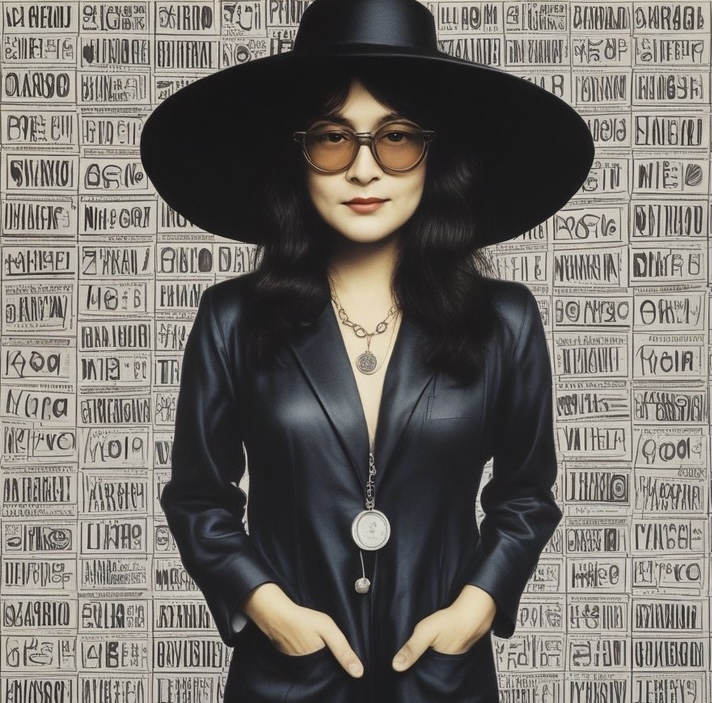
In a world that often marginalizes the contributions of women, particularly those who embrace innovation and challenge societal conventions, Yoko Ono emerges as a beacon of creativity and a transformative force within the artistic landscape.
The Japanese performance artist, musician, and activist has spent her life breaking down barriers, not just in art but also in the broader societal context, where she has championed the ideals of peace, diversity, and inclusion. In an era where ageism, sexism, and racial prejudice still permeate culture, Ono stands resilient, continuing to inspire and engage with audiences around the globe.
Born on February 18, 1933, in Tokyo, Japan, Ono’s journey into the world of avant-garde art began when she moved to the United States in her 20s in the late 1950s. She quickly became entwined in the New York City art scene, collaborating with influential figures such as John Cage and Andy Warhol.
Her conceptual art pieces and performances often provoked both admiration and criticism, but they unerringly challenged the status quo. Through her art, Ono has always sought to engage with the public, inviting them to participate in her work, fostering a culture of inclusivity and dialogue.
Ono’s ethos of peace and her resolute stance against war were crystallized in the pivotal anthem “Give Peace a Chance,” co-written with her late husband, John Lennon as well as being the original creator behind the concept of Lennon’s signature song Imagine. These songs embody Ono’s lifelong commitment to activism; an unrelenting voice resisting hatred, racism, and violence.
Beyond her music, Ono’s artistically challenging performance art has continually rallied against injustice and inequality. Pieces like “Cut Piece” showcased the vulnerability and strength of women, forcing audiences to confront their complicity in societal norms and behaviors.
As Ono ventured into the 2000s, her career took an audacious turn. Up against the toxic cultures of ageism and sexism in the music industry, Ono emerged as a powerhouse on Billboard’s Dance Club Songs chart, achieving thirteen number-one singles.
Starting around 2001, DJs began remixing Ono’s earlier work for dance clubs. This led to a series of chart topping remixes which outperformed contemporary artists like Madonna and Mariah Carey. Three critically acclaimed anthologies would follow: “Yes, I’m A Witch”, “Open Your Box” and “Yes, I’m A Witch Too”.
In 2008 Ono was named Billboard’s #4 Hot Dance Club Play Artist of the Year after securing multiple number one hits, including a streak of six consecutively. Three years later, in 2011, she was once again honoured by the magazine for her second run of five consecutive number one hit singles on the Dance Club Songs chart.
Currently Yoko Ono is ranked 11th in the category of most successful dance club artist of all time by Billboard magazine. This ranking is based on her success with remix singles from her catalog which include multiple number one hits on the Billboard Dance Club Songs chart including “Walking on Thin Ice,” which landed at number one in 2003 when she was a remarkable 70 years old, making her the oldest artist to achieve this honor.
Ono’s series of landmark achievements ignited a resurgence of interest in her work. With hits spanning “No, No, No,” “I’m Not Getting Enough,” and “Move on Fast,” Ono not only claimed her rightful place in the music industry but also carved out a space for older artists, particularly women and racialized artists often sidelined in popular culture.
In 2014, Ono, at the age of 81, made her Glastonbury Music Festival debut, a testament to her undying spirit and unyielding dedication to her craft. This performance was not just a set on a stage; it was a declaration of her right to exist within rock ‘n’ roll culture, a space historically dominated by younger artists, predominantly male and European in background.
Ono’s presence at Glastonbury sent shockwaves through the industry, reinforcing the idea that our cultural narratives don’t have to adhere to conventional timelines. The familiar mantra “Age is just a number” truly echoed through the grounds of Farm as the 81 year old Yoko Ono took to the stage dancing, captivating the audience.
Ono’s commitment to the innumerable contributions of feminist ideals extends far beyond her personal triumphs; it encompasses her work as a visionary artist and activist. She champions the importance of representation in both art and music, advocating for diverse voices and narratives that resonate with the underrepresented.
As Ono grapples with the complexities of identity, race, and gender, she has consistently stood firm against racism and bigotry, encouraging dialogues that transcend borders and societal constructs.
In a landscape fraught with division, Yoko Ono embodies unity, creativity, and resilience. Her breakthroughs in music, art, and activism have altered the trajectory of global culture, instilling a sense of hope and possibility for future generations.
As she continues to break records and norms, one thing becomes abundantly clear: Yoko Ono is Rock N Roll AF, and her story is far from over. Her journey reminds us all that the power of art can change the world, urging us to embrace diversity, promote peace, and stand firmly against hatred, no matter what our age or background.
Yoko Ono will forever illuminate the path for countless artists who dare to dream beyond the confines of societal expectations. Yesterday, today, tomorrow and beyond.
To be continued…
